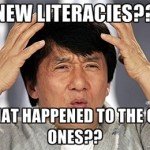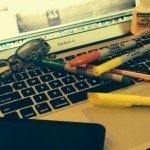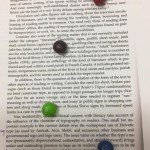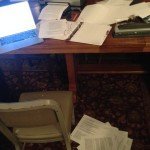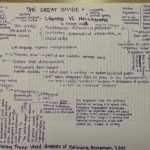Larisa Perkins-Orta: Curated Blog for Week 9
The Last Melon
As always, we started our night together with food, and some good conversations like a weekly meeting between friends. I don’t think there has ever been a warmer feeling than walking into this grad seminar each week. We laugh, we cry, and talk about life in the worst and best ways. This session we talked a lot about our projects for the rest of the semester, taking turns in talking though our ideas at the start. We even ended up deciding that a Poster Session wouldn’t be beneficial to everyone so Kim went ahead and said dealer’s choice. Tim, unsurprisingly after last week’s focus on tattoos, coined the term “outlier literacies,” which from what I understand are things like prison tattoos and art, something that is mainstream yet in its own subgenre of that mainstream thing. Cassidy wanted to look at the World Wildlife Fund and the literacies that go into animal conservation, research, their website and operations. Hayden decided to study agency, and agency in composition classrooms and how teachers go about their strategies teaching, the ecological conception of agency. Ben was torn on doing something about a hashtag on twitter that is authors pitching their books live to try and get them published and the literacies of stickers on laptops. We then spent time talking about our own “isms” about stickers and all had fun sharing. I personally hope he does sticker literacy because it sounds so fun!
 I talked about focusing on the literacies of Visual Kei and KPOP and the differences between the two cultures of the fandom that has been created. Travis was torn between doing video game cultures of really difficult games like Bloodborne/Dark Souls and the literacy behind those games and how they are played. Brooke was going to talk about the literacies of Starbucks, and the idea of sponsors within that realm which sounds so interesting as well. Alo wanted to focus on the literacies of Veterans after they come back and interview people like her brother (and Tim volunteered) and the things they go through. Brady finished off the group share by talking about how he wanted to do the literacies of after school reading and writing in middle school, or the literacies of Taylor Swift’s writing literacies and her fans’ literacies, and then given Brady’s interest in space/place, he of course is considering the literacies about spaces and rural ‘cities’ like Chico.
I talked about focusing on the literacies of Visual Kei and KPOP and the differences between the two cultures of the fandom that has been created. Travis was torn between doing video game cultures of really difficult games like Bloodborne/Dark Souls and the literacy behind those games and how they are played. Brooke was going to talk about the literacies of Starbucks, and the idea of sponsors within that realm which sounds so interesting as well. Alo wanted to focus on the literacies of Veterans after they come back and interview people like her brother (and Tim volunteered) and the things they go through. Brady finished off the group share by talking about how he wanted to do the literacies of after school reading and writing in middle school, or the literacies of Taylor Swift’s writing literacies and her fans’ literacies, and then given Brady’s interest in space/place, he of course is considering the literacies about spaces and rural ‘cities’ like Chico.
In the second half of our session Sel arrived, an undergrad in our English program who was invited to discuss their research. Our conversation shifted to the article that was the result of a similar project they did for Kim in undergrad about deconstructing evangelism. This was a deep dive into the subreddits of openly Christian or progressive Christians and the exploration of the literacy of what happens with those who end up questioning the faith they, as Sel says, “that I’d known since I could read and write.” Sel who is not only queer but identifies as non-binary as well now, said when doing this project, they started it only because they thought it would be interesting not looking for answers. What the overwhelming responses were was that people didn’t like the negativity, the old fashioned beliefs that were expected and required to be a part of the church, and most circled back into their faith after finding a new way to practice by following their own morals along with the faith. Hayden and Ben both had a lot more personal stakes and connections than the rest of us, as they both talked about their struggles with religion and the similarities between the phenomenon of eventually coming back to it with a different approach. Deconstruction is not a rejection of religion but a deeper dive into what the religion itself is, moving past the “overpriced lights and the carefully decorated stages.” That was actually a line people narrowed in on because church is such a staged event but the religious part is the focus. The fallacies of the church fall behind the curtain though it’s all around you. We talked a lot about the statistics Sel was able to gather from her large survey, the types of questions and wording (some of us still focused on the project I think more than anything) and the techniques behind doing the research that Sel had done as well, which helped us out make this project seem more viable.
It was interesting to read this information though I was apprehensive about talking about religion. Religion is something that leaves a bad taste in my mouth, I have always seen it as a weapon, a vessel to excuse hatred towards people of color, queer, women, people who have different opinions even. It is and was a weapon of mass genocide, in the guise of ‘saving’ people, this savior complex that is indoctrinated onto people who don’t have enough free will to go through life on their own. I always wondered why they felt the need.
“Who told you it was your job to “save” people? Mind your own business.”
I still think that, I won’t lie.
How ever, Sel’s article and research did give me more hope that the many facets of people who are religious are not all vessels of weaponized beliefs. I will never be a religious person, but I think I will approach it with a more open mind when someone else talks about their faith; tell me they have it and not assume they are going to try and use it to hurt me. Maybe that fear is through my own learned literacies though, what I was taught by my dad who hates religion and my mom who sometimes blindly follows it, and falls out of it to make it more confusing. I’m not sure, but I am left wondering about how my reaction to religion correlates with my other literacies. I will find out more when we talk about queer literacies I’m sure, as I do put the B in LGBTQIA+.
ever, Sel’s article and research did give me more hope that the many facets of people who are religious are not all vessels of weaponized beliefs. I will never be a religious person, but I think I will approach it with a more open mind when someone else talks about their faith; tell me they have it and not assume they are going to try and use it to hurt me. Maybe that fear is through my own learned literacies though, what I was taught by my dad who hates religion and my mom who sometimes blindly follows it, and falls out of it to make it more confusing. I’m not sure, but I am left wondering about how my reaction to religion correlates with my other literacies. I will find out more when we talk about queer literacies I’m sure, as I do put the B in LGBTQIA+.
To be Continued?
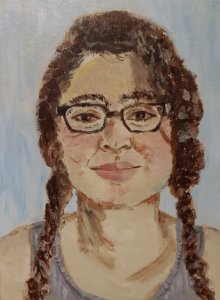 Author Bio: Larisa Perkins-Orta, an English Literature graduate student, teaching a composition class and navigating the many facets of school, work, mental illness and a pandemic.
Author Bio: Larisa Perkins-Orta, an English Literature graduate student, teaching a composition class and navigating the many facets of school, work, mental illness and a pandemic.
